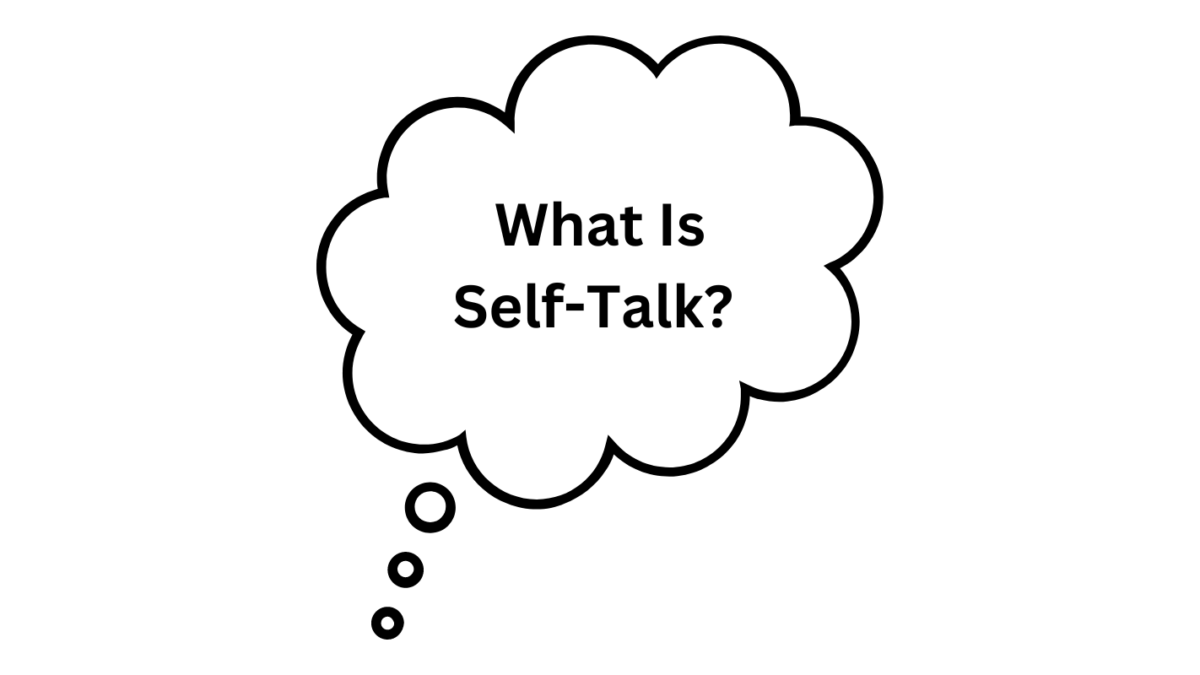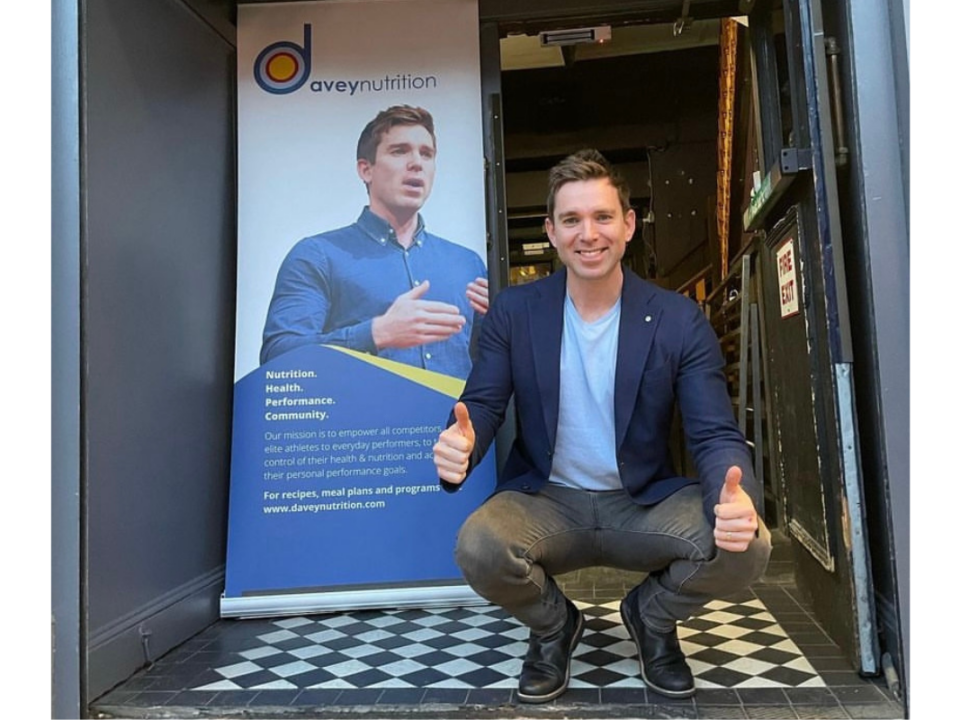Self-talk – Far Below The Surface, That’s Where Real Change Happen!
Is self-talk good? Why do we self-talk? If I knew then what I know now! We have all heard it. Well, I wish I had heard about the power of ‘self-talk’ when I was aiming to be the best footballer I could be. The words we use to speak to ourselves over and over again during the day have this huge potential impact on how we feel. When we speak the language of positivity, we feel the impact on our body and mind. The opposite is true when we are harsh and unnecessarily critical. This concept is not new, and I am not sharing something that is novel in the space of psychology. It comes naturally or easier to some people due to their natural disposition or indeed the environment they were brought up in.
 Where does negative self-talk come from? Sometimes our negative self-talk is a result of external criticisms or societal standards. Internal beliefs vs external noise – it is vital that we take time to recognise the difference and challenge where it’s coming from. In the words of Mahatma Gandhi, “Your beliefs become your thoughts, your thoughts become your words and your words become your actions”. It seems so clear and obvious when described simply. Think words that make you see things in a positive light and you will feel better about yourself. In today’s complex and busy world we need to be constantly reminded of what helps us be consistent in our daily actions and indeed in our careers, relationships and physical and mental performance. We can build a huge deal of resilience, consistency and confidence from creating a personal dialog or language for success. This is something I have seen the best athletes use day to day in training and in the lead up to big performances. We can learn from the simple practices of the best performers to be high performers in our own day to day life.
Where does negative self-talk come from? Sometimes our negative self-talk is a result of external criticisms or societal standards. Internal beliefs vs external noise – it is vital that we take time to recognise the difference and challenge where it’s coming from. In the words of Mahatma Gandhi, “Your beliefs become your thoughts, your thoughts become your words and your words become your actions”. It seems so clear and obvious when described simply. Think words that make you see things in a positive light and you will feel better about yourself. In today’s complex and busy world we need to be constantly reminded of what helps us be consistent in our daily actions and indeed in our careers, relationships and physical and mental performance. We can build a huge deal of resilience, consistency and confidence from creating a personal dialog or language for success. This is something I have seen the best athletes use day to day in training and in the lead up to big performances. We can learn from the simple practices of the best performers to be high performers in our own day to day life.
 How Negative Self-talk Affects Us
How Negative Self-talk Affects Us
“I just can’t be consistent; I go through phases of really high levels of motivation but I seem to find myself back exactly where I was in the beginning every time, 1 step forward and 2 steps back”. These are the words I hear from people over and over again. It brings about mixed emotions because I know how frustrating it has been for them but I also think to myself, I know I can help if the person focuses their attention and efforts in the right area. The important thing is that the person is not only ready to change but also open minded to the process of changing the focus to building better habits, behaviours and a more positive relationship with food, and, often their self image. Self-talk has an important role to play in all of this because you talk to yourself more than anyone. Your words and thoughts can have a dramatic impact on your potential to achieve your goals. In the words of the legendary roman emperor Marcus Aurelius:
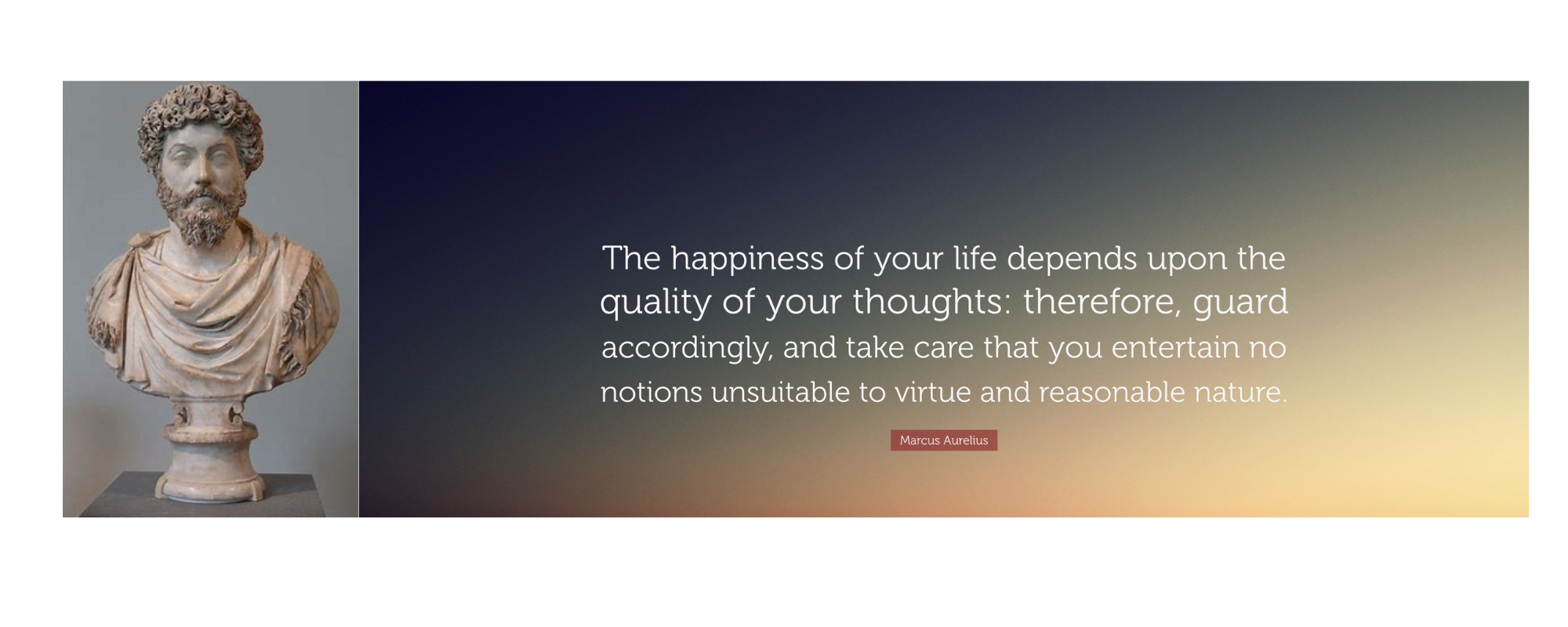 Self-talk is also known as your inner voice and the ongoing conversation that goes on in your head. It can have a significant impact on your mood, confidence, mental health and without question your relationship with food.
Self-talk is also known as your inner voice and the ongoing conversation that goes on in your head. It can have a significant impact on your mood, confidence, mental health and without question your relationship with food.
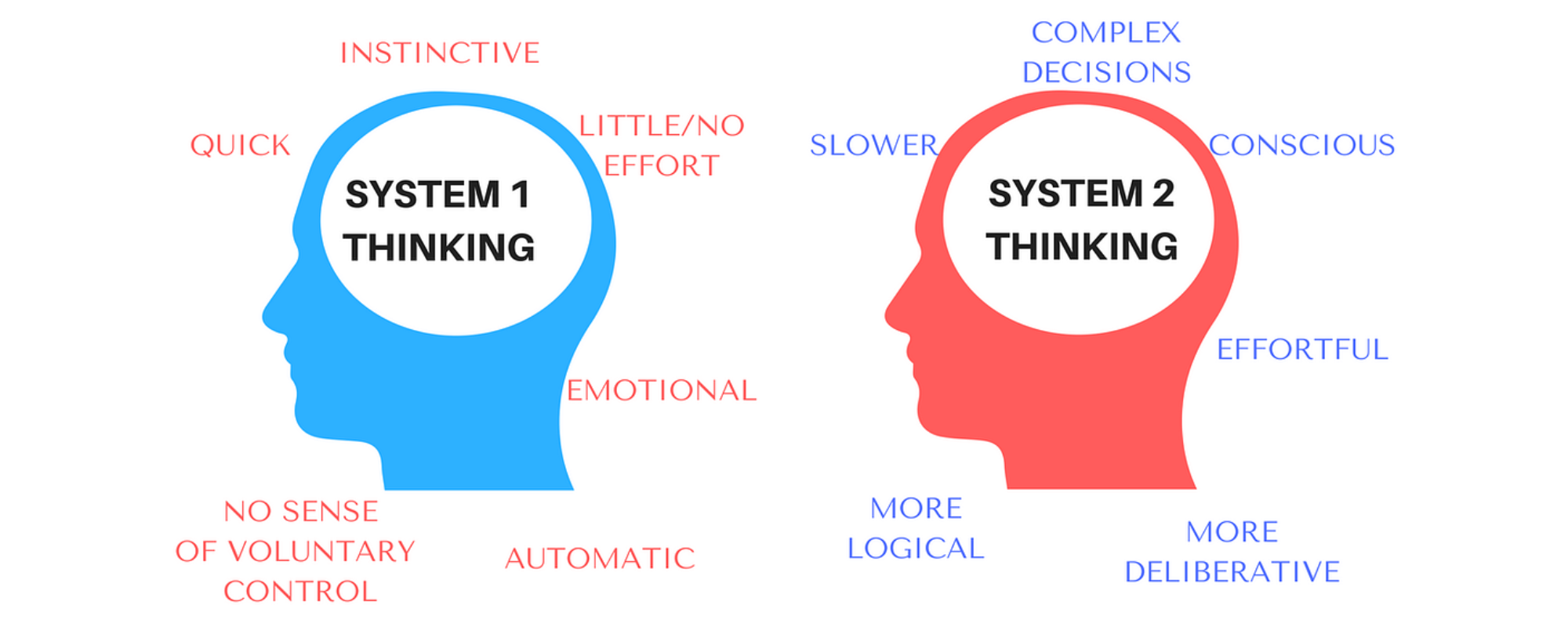 What Are Self-talk Patterns?
What Are Self-talk Patterns?
System 1 and 2
The Nobel prize winner and author of ‘Thinking Fast and Slow’, Daniel Kahneman describes self-talk as two different systems, System 1 and System 2. In simple terms, System 1 self-talk brings current experiences into awareness in a way that’s an ‘emotionally-charged reaction to a situation’. System 2 self-talk may lead to ‘logical, positive and motivational self-talk’. An example of system 1 self-talk which is heavily emotional led may be something like the following. You decide to have a biscuit with your cup of tea but one turns into 2 and in a short space of time you have eaten 6 or 7 biscuits. You say to yourself, ‘you glutton, you’re a greedy pig, why didn’t you stop after 1-2, now you have blown your good day of eating. I have no self-control’. In contrast, here is an example of how system 2 self-talk could develop which is logical, constructive and reflective. ‘I ate too many biscuits, it didn’t feel good and on reflection my energy levels weren’t sustained. My next food decision will be a good one and in the bigger picture it can be managed with other good decisions. On reflection I wasn’t even hungry when I ate all of those biscuits and it was more from boredom. I will learn from that and assess next time if I really want the treat, I will think more about the actions that help deal with the boredom’. A phrase often used by professionals in the nutrition world is, ‘if hunger is not the problem, then food is not the answer!’ Since exploring the concept of mindfulness and mindful eating, one very powerful technique that I have adopted and indeed shared is a simple technique which is ‘Pause, Breathe and Proceed’. The ‘pause’ is the most difficult part of the process but it will help to allow you to think about your habits and assess your decisions. There are not simple and drastic results but if you are looking for better long term decision making then these are the tools to get you there.
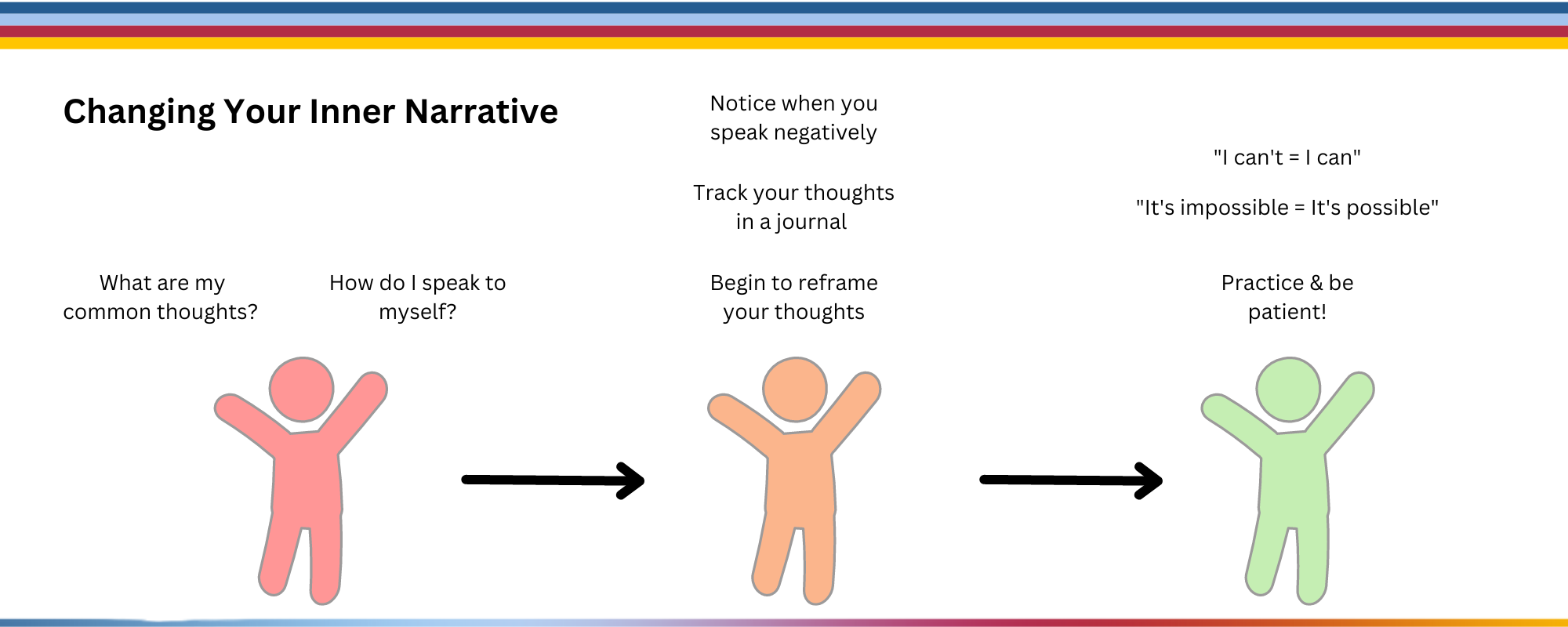 How Do You Positively Self-talk?
How Do You Positively Self-talk?
It starts with reflecting on your own words and language, asking yourself how you speak to yourself, what are your common thoughts? Particularly when you are trying to be consistent with your actions or behaviours. If you find your self talk to be negative or very self critical, begin to track it using a journal, notice when it happens and begin to reframe it. Practice saying ‘you can do it’, when previously you might have said ‘I can’t. ‘It’s impossible’ becomes ‘possible’ if I start, if I am patient and if I take it one step at a time. Positive self-talk can be powerful and transform our thinking with the right mindset and approach but it doesn’t always come naturally. You must practice it and be willing to learn from your own reflective practice. It takes honesty and repetition but you will unblock so many answers and begin to learn so much about your own emotions and how they impact your decision making.
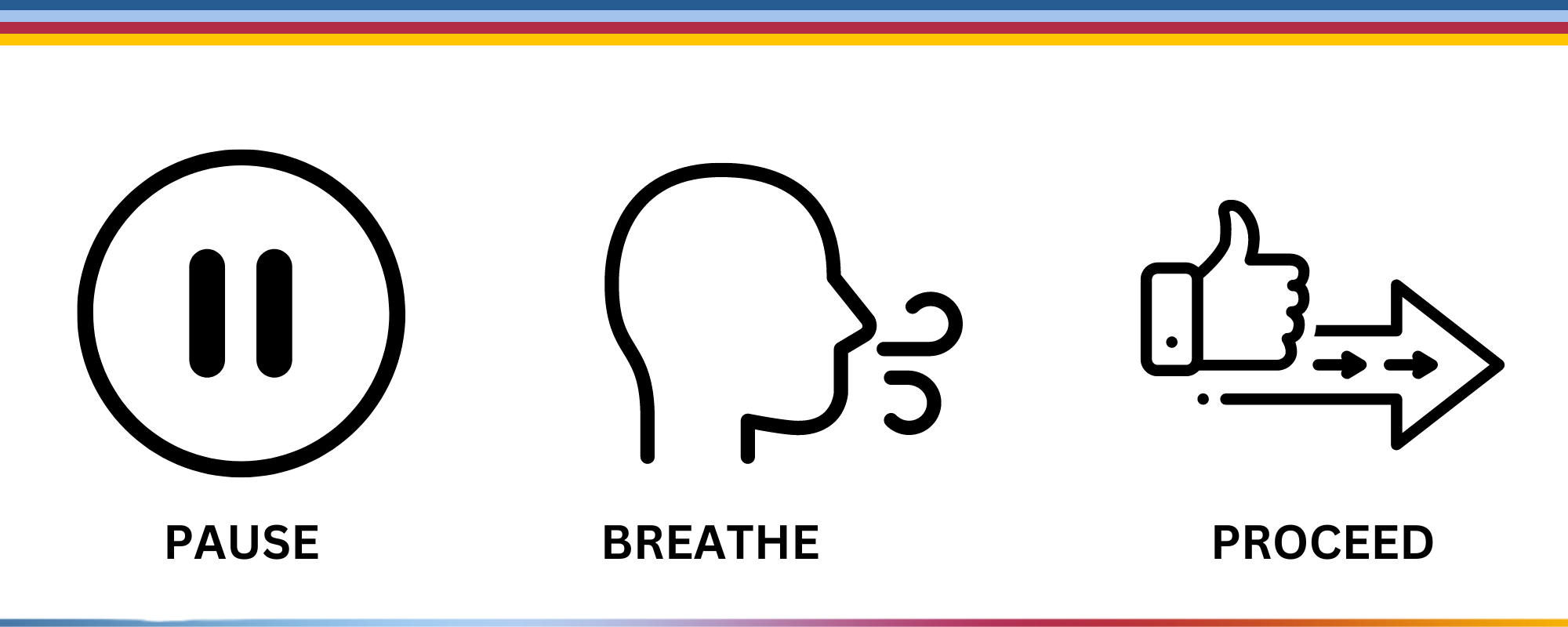
Change your inner narrative – Pause, Breathe & Proceed |
|
|
Examples of Negative Self-talk |
Examples of Constructive Self-talk |
| I am just not able to commit to good habits consistently. | Here are the 3 things I am going to commit to…
This is an exciting new challenge for me. |
| I don’t have the cooking skills to make a complex recipe. | I am going to pick 2 simple recipes with ingredients I recognise to cook this week.
I am going to learn a lot through trying new things. |
| I don’t like many fruits & vegetables and feel there are very few meals I like. | Here are the fruits and vegetables I like, I’ll find suitable recipes for these to make tasty meals. |
| I just can’t say no when I am offered a treat or foods I know I shouldn’t be eating in excess. | Treats are ok but when I have enough and I am satisfied I don’t eat them mindlessly. |
| I am so confused about nutrition & I really don’t know what to eat. |
This is what I understand about nutrition, fruits & vegetables are important & I feel good when I eat nourishing meals. |
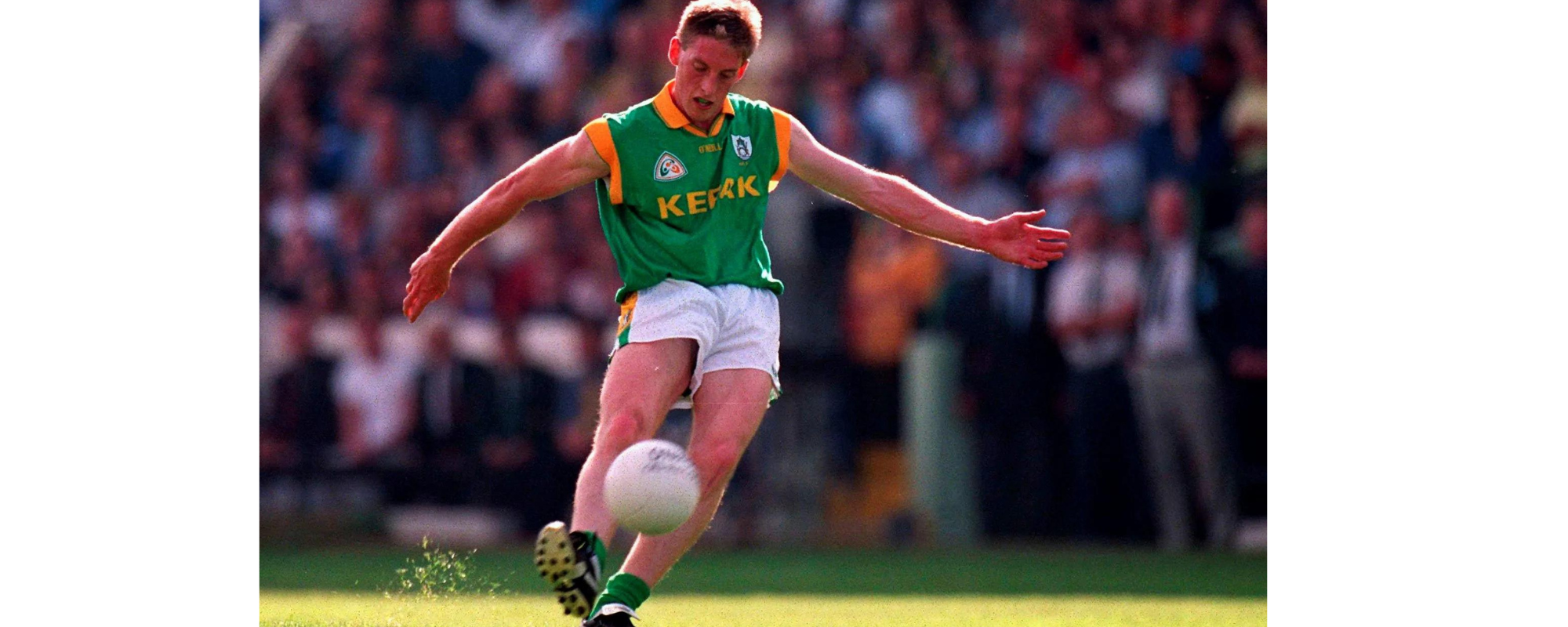
Can Self-talk Affect Performance?
I can still remember sitting on the couch in our sitting room at home in Sligo watching championship matches with my dad. One particular moment that sticks out was watching Trevor Giles of Meath playing in the championship in 1999 with his sleeves cut off. He was quoted saying it was down to the hot summer and seeing the types of jerseys worn in Aussie rules football but it was some statement for a GAA athlete in the 90’s. He was on fire that year, controlling the game and involved in most of the positive forward play. It wasn’t all perfect, it rarely is. He missed some scores he should have gotten too. My dad kept saying ‘look at how his head doesn’t drop, look how quickly he moves on from a mistake to the next play, the next moment, that’s the hallmark of a top class player’. I never forgot it, and I remember thinking I want to be like that, but I wasn’t. I put so much pressure on myself, I just wanted success individually and for my team so badly that often it made me feel lethargic, flat and when I made mistakes in games I just couldn’t let it go. I shout, scream and roar with frustration.
 Fast forward 10 years, I am in a professional environment surrounded by the best coaches and players in the country who speak a different language, particularly to themselves. The best athletes speak a language of confidence, positivity and repeatedly fill their minds with a reservoir of positive dialog and affirmations. I can, I will, I will find a way, there is always tomorrow, I will come back stronger, there is better, I am stronger, we will win if I am on the pitch, I will get the next one, I will learn from the experience. It is endless and most importantly it’s personal and each person or athlete finds their own words that have deep meaning to them.
Fast forward 10 years, I am in a professional environment surrounded by the best coaches and players in the country who speak a different language, particularly to themselves. The best athletes speak a language of confidence, positivity and repeatedly fill their minds with a reservoir of positive dialog and affirmations. I can, I will, I will find a way, there is always tomorrow, I will come back stronger, there is better, I am stronger, we will win if I am on the pitch, I will get the next one, I will learn from the experience. It is endless and most importantly it’s personal and each person or athlete finds their own words that have deep meaning to them.
 Self-talk In Sports
Self-talk In Sports
Novak Djokovic recently was recorded speaking about mental toughness to a young group of tennis players. He said, the mind is a ‘traveler all the time’. We can often think ‘what if’ and it can be really hard to stay in the moment. If you lose your focus, it’s about accepting it, accepting the moment and the citation, ‘it is how quickly you recover from the emotion that can separate you from others’. That’s a real insight to have from one of the greatest sportspeople of all time.
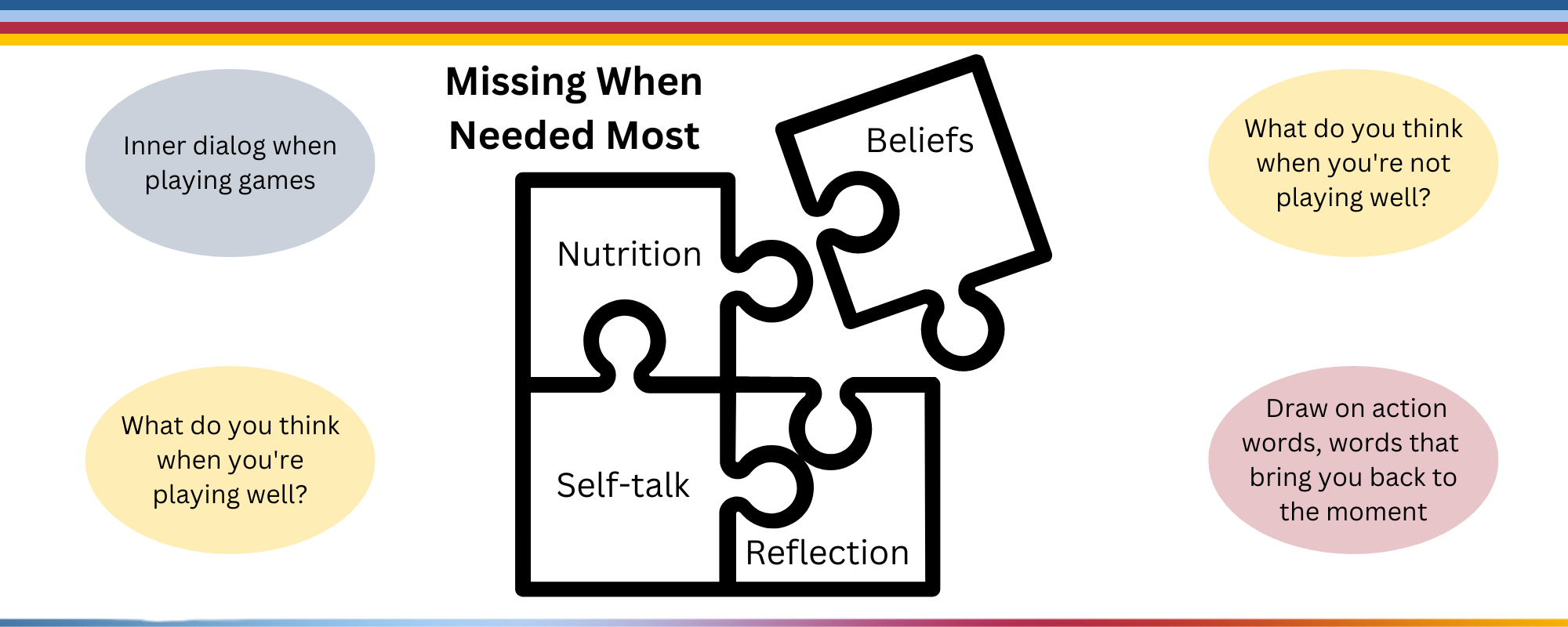 I Was Missing When I Was Needed Most
I Was Missing When I Was Needed Most
I was working with a client called Cillian over the past 18 months. He is an intercounty footballer who came to me to work on his nutrition. Very quickly I realised that while there were areas of his nutrition that could improve, it was his attention to his concentration, self-talk and beliefs that required his investment. I challenged him to think about his inner dialog when playing games, what he was thinking when he was playing well, what he was thinking when he wasn’t. There was no lack of effort but he described situations where he felt he was going out of games ‘disappearing’ or ‘going out of games’ when he should be having the biggest impact and stepping up for his team. His focus was very simple, when he noticed this happening he must draw on action words, words that would bring him back to the moment, ‘accept’ his mistake and ‘move on’ ‘work-rate’, ‘hard run’, ‘show’ ‘I am here’, slowly it began to work. He grew and his performances began to become more consistent and over the course of 12 months he was acting like a different person, a high performer. I could feel the hair rise on my neck as he told me he was making a real impact on games. When it mattered most he was right there in the mix, showing up with the big score and leading. I told him I was so happy for him, but I only wished someone had this conversation with me. No regrets about my own time, but it feels good to be able to help others lift the weight of expectation we place on ourselves. Not to mention his detail in nutrition and his overall preparation also improved. He saw how each piece is connected and that nothing works in isolation when it comes to high performance.
Is The Easier Option Always Best?
This is an athlete with a focus on high performance but the same principle applies to anyone aiming to achieve a goal with a weight of expectation. Fat loss, a better relationship with food, a greater level of consistency with healthy habits. Other clients I have worked with, Tara and Carmel, who were happy for me to share their kind words of feedback, remarking, “Honestly I can’t believe I achieved my goal. I feel confident again for the first time since my 20s”. Carmel shared this which was incredible to read. “Not to sound corny but the can of worms that you opened are now turning into butterflies, lol! I am so glad I reached out. Thank you for not giving me the easy option (a strict meal plan) which looking back would only have pushed me further into a grave. It is laughable at how I focused on getting healthy with food when I didn’t even have an ounce of energy in me to do that, really it was the last thing I was able for. I know my journey is not finished, it doesn’t end here but I am happy, which is something I haven’t felt in the longest time”. Carmel bought into the process. It isn’t easy to come looking for a simple solution and be sent away with some hard questions to answer, but look at her results, she is happy.
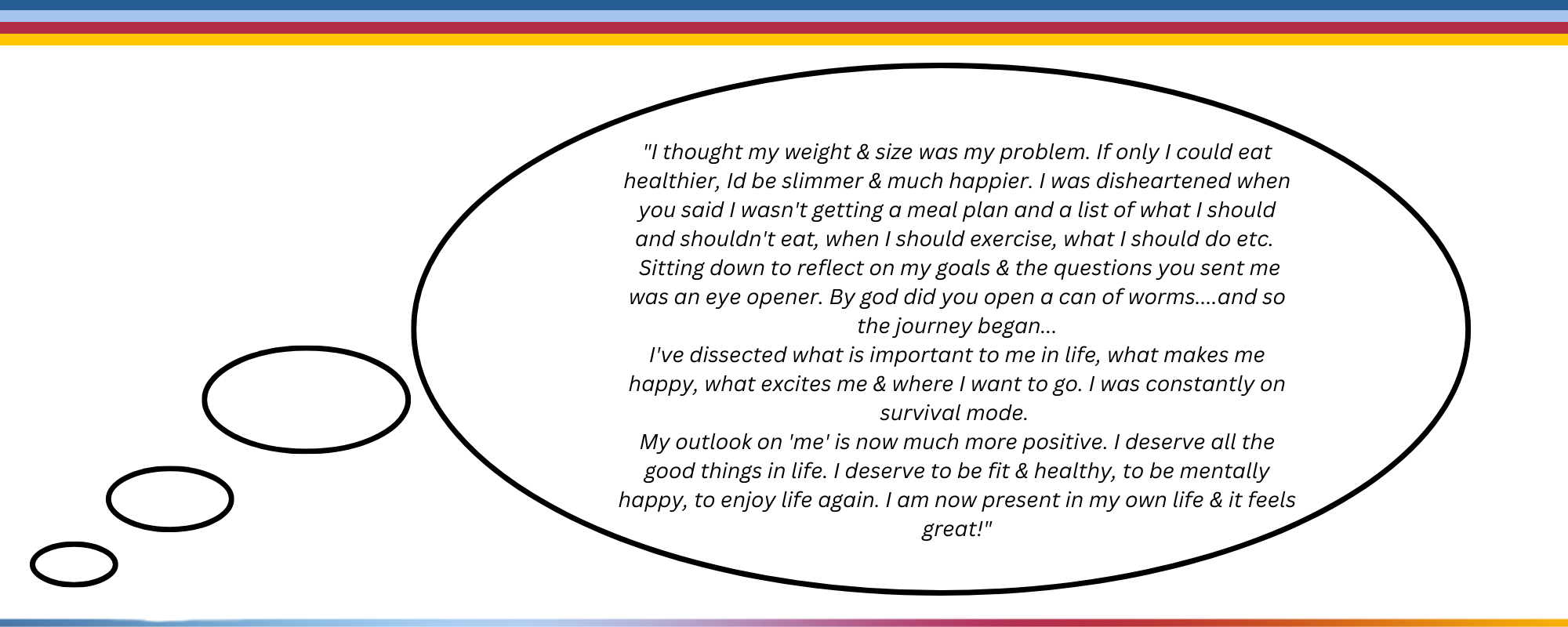 Sometimes what we think we need is to run harder, lift heavier, push more or train harder, but what we really need to do is listen to our thoughts and our words. Challenge our thinking and create a new dialogue. I have seen its power, felt its impact and experienced how the best athletes and performers overcome adversity and perform at their best, even when the odds are against them, by strengthening their inner dialog. Far below the surface, that’s where real change happens. The language we use internally has the power to shape our perception, action, and reaction. Positive self-talk can transform not just specific events but the overall trajectory of our life. The best performers, whether in sports, arts, or business, have harnessed this tool, and so can anyone willing to train their mind for success.
Sometimes what we think we need is to run harder, lift heavier, push more or train harder, but what we really need to do is listen to our thoughts and our words. Challenge our thinking and create a new dialogue. I have seen its power, felt its impact and experienced how the best athletes and performers overcome adversity and perform at their best, even when the odds are against them, by strengthening their inner dialog. Far below the surface, that’s where real change happens. The language we use internally has the power to shape our perception, action, and reaction. Positive self-talk can transform not just specific events but the overall trajectory of our life. The best performers, whether in sports, arts, or business, have harnessed this tool, and so can anyone willing to train their mind for success.
If you would like to book a consultation with my team or I please email expertsupport@daveynutrition.com or click on this link.




